They spent £150 million in the summer so why are Manchester United even worse than last season?
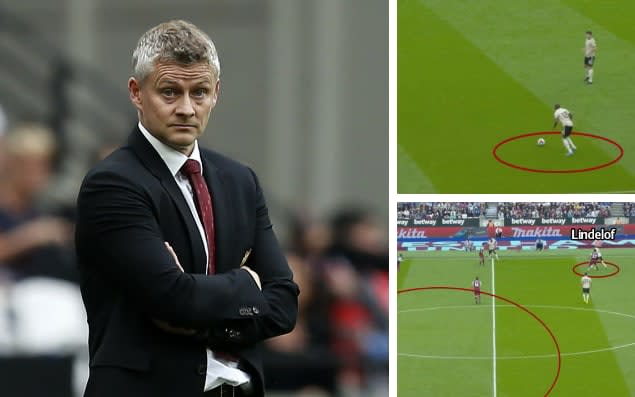
After winning 14 of his 19 games in charge as caretaker manager, Ole Gunnar Solskjaer has only won five in 17 since taking the permanent job. The momentum is gone, the fear factor has evaporated - quite simply, Manchester United aren't very good.
The club's descent from title challengers to Europa League maybes has been painful for United fans to watch and recent performances have done little to suggest this is a team capable of achieving anything more than the bare minimum. More worrying is what does the minimum even look like for 2019/20 Manchester United? Why are they worse than last season?
Why Manchester United have struggled this season
Jose Mourinho was fully aware of how limited his squad was and implemented a dull, defensive style of football that supporters and neutrals disliked equally. Without dependable centre-backs, quality full-backs or a solid, hard-working midfield, United couldn't afford to open up against teams poised to hit them on the counter-attack.
Too few players made forward runs off the ball and passing options were limited in attack, yet two seasons ago United finished second with 63 goals scored and 28 conceded - the best defensive record of any side in the league.
Mourinho's pragmatic approach sucked the fun out of Old Trafford but it got results. Solskjaer's have dried up. He wants to play dynamic attacking footbal and to hurt teams on the break but opposing managers have figured out that if you let United have the ball, they run out of ideas: Southampton had 41.4 per cent possession in a 1-1 draw, West Ham had 46.2 per cent possession in a 2-0 win, Crystal Palace had 28.7 per cent possession in a 2-1 win.
If United have more of the ball than their opponents they need to be able to break them down. Some teams do this by shifting the opposition defence around with quick passing to create gaps between players to thread a ball through to a striker. Other managers deal with it by dropping slightly deeper and encouraging the defensive team to open up a bit before pouncing on them at halfway, something Mauricio Pochettino's Spurs do particularly well, and a tactic Mourinho failed to sell to fans of the Sir Alex Ferguson era.
To play on the front foot, Solskjaer has his players make early forward passes as often as possible, stretching play by hitting it wide and over the midfield so that United can get at opponents quickly.
Throughout the defeat to West Ham, United players were unable to pass forwards along the ground, with no midfielders dropping into space to offer an option. Here, in the 14th minute, Aaron Wan-Bissaka has no choice but to go back to Victor Lindelof, or pass inside to Nemanja Matic.

Lindelof chips a ball towards the channel.
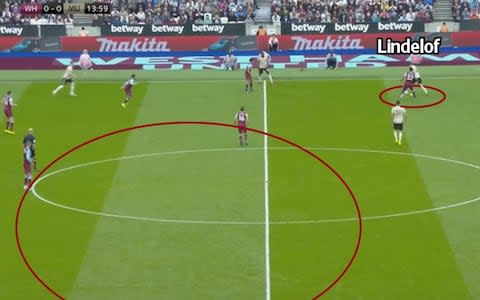
United were set up to expect these early forward passes so nobody dropped into midfield positions to receive a short pass then turn and link play. A narrow attacking shape made it easy for West Ham to squeeze the pitch and reduce space.
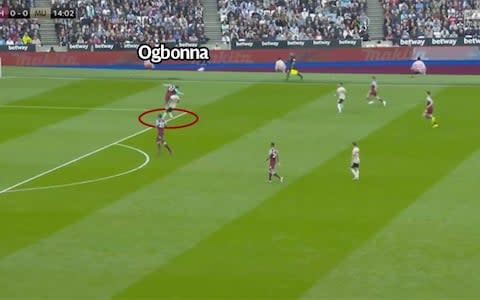
Angelo Ogbonna heads away the aimless chip from the back and West Ham win possession.
Solskjaer does not have United lurking at midway, waiting to hit West Ham in transition. Rather, they attempt to win the ball high up the pitch having chased it there. In order to keep the other team pinned back they send players forward, which leaves the midfield and then the defence vulnerable.
United's lethargic buildup play appears to lull them into a state without urgency to win the ball back, as seen for West Ham's opening goal with passive midfielders standing off their opponents. When they do try to up the tempo and look for the forwards, they turnover possession too easily.
By trying to be more entertaining, Solskjaer has made United easier to beat - the style of play is in place but the players to execute it are not. United's players look trapped somewhere between the laborious buildup of the Louis Van Gal era, the careful, defensive nature of Mourinho and now the confusingly forward thinking Solskjaer, as though flicking through the channels of a television without having established who is in charge of the remote.
The players aren't good enough
On form and afforded space, United are excellent to watch on the counter-attack. Chelsea were pulled apart in an opening day 4-0 win but since then, Solskjaer's team have only beaten Leicester, and that was thanks to a penalty.
For all the planning, analysis and coaching done on the training ground, what is a manager supposed to do when his most experienced player decides to pump the ball out of play under absolutely no pressure?
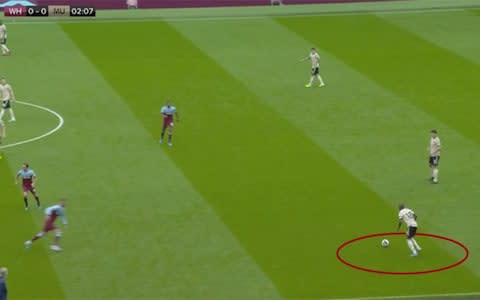
This is the standard that Young sets of his young teammates inside the third minute of the game: rushed, panicked, thoughtless, devoid of quality.
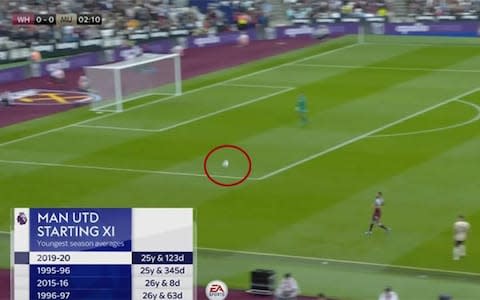
West Ham knew that United would look for their pacy forwards. Their forward press showed United's play wide and their defensive line adjusted to each situation, staying high when United were deep and dropping back during approach play. Almost every promising United move down the flanks broke down in the final third as West Ham led United into a corner and stole the ball - without the requisite pace, movement or battling spirit, United's attacks were easily neutered.
Pogba is the only elite level player in the squad but even he makes errors that cause his teammates problems, caught in possession while trying to make things happen, taking responsibility in knowledge he is the only individual capable of providing a necessary magic spark.

Young is 34 and a squad player at best. Aaron Wan-Bissaka is young and needs to play next to quality and experience but has Victor Lindelof to his left, who so regularly misreads high balls that he is now actively targeted by opponents. Crystal Palace and Southampton both benefitted from aerial errors on his behalf.
Matic is a good player but not a Champions League level one, McTominay is fine, Mata was great seven years ago, Jesse Lingard is inconsistent, Anthony Martial scores a stunner one week and is a ghost the next, Marcus Rashford does the hard things well and the simple things - like getting into scoring positions and grabbing tap-in goals - rarely. Daniel James is a rare creature who opposition teams will start to mark. Andreas Pereira looks doomed to mid-table La Liga anonymity within a couple of seasons. "Alexa: what is Fred?" Marcos Rojo is still around.

In United's last league winning season (2012/13), Phil Jones was understudy to Rio Ferdinand, Nemanja Vidic kept Jonny Evans out of the team, Patrice Evra was 31 years old, and peak Wayne Rooney and Robin Van Persie were the forwards. Ryan Giggs played in midfield next to Michael Carrick, Paul Scholes featured in 16 league games. The pitch - not just the dressing room - was full of proven winners playing at the top level.

The worry is that having seen the post-Mourinho enthusiasm dissipate, the most likely way to get more out of this very expensive collection of assets might be to replace the manager. Again. The only way to actually improve the team is by bringing in better individual players who elicit the potential of the young, upcoming core of youngsters and forging them into a unit capable of challenging. Jurgen Klopp finished eighth in his first season at Liverpool but with clever planning and shrewd signings created the machine that currently sits top of the table - will Solskjaer be given that same time?
The randomness of United's results makes every turned corner make it seem like they're trapped in a maze. Without boundless energy or positional discipline, at the moment United's midfield serves as a placeholder between defence and attack, neither creative or destructive, lacking the pace and snap of Premier League rivals.
Familiar problems
Solskjaer has been relentlessly optimistic since taking charge but must wonder how much longer he can go on before it weakens his position. Coaches are taught to be encouraging because it helps breed confidence - a negative manager will breed negativity - but if players know they can get away with mediocrity without repercussion, the standards set are lower than they need to be.
Louis van Gaal struggled with the same individuals as Mourinho, just as Solskjaer is now having to paper over problems with smiles and upbeat press talks about the "good bunch of lads". Of the starting XI against West Ham, only David De Gea, Nemanja Matic, Ashley Young and Juan Mata had won the Premier League, the latter three considered important squad members despite being past their best. The club has fallen so far from the upper echelon that none of their first team players would get near the Manchester City bench.
Are #MUFC worse than last season?
"Maybe people think that I am enjoying the situation. I am not enjoying it at all."
Jose Mourinho is sad about #MUFC's demise, saying they are worse than last season and that they will struggle to get into the top six: https://t.co/eoweh9WNZ7pic.twitter.com/plSVOYwVOY— Sky Sports Premier League (@SkySportsPL) September 23, 2019
"I think they are going to really, really be in trouble to get not just into the top four but potentially in the top six," said Mourinho on Sky Sports. “I think this team is worse than the team of last season.”
The common theme in each cycle of post-Ferguson manager is that the players haven't performed to the required standards. Increasingly it seems clear that no matter who is in charge, the personnel on the pitch simply haven't been good enough. The penny may have dropped.
